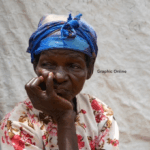
Beyond the statistics of the recent Gbenyiri clashes in the Sawla-Tuna-Kalba District are tales of despair, trauma and uncertainty as the displaced residents struggle to cope with their losses and the fear of an uncertain future.
Among the victims is Lizzy, a little girl whose childhood has been shattered.
She lost her father in the violence, and her mother, unable to bear the tragedy, has abandoned her at a temporary camp in the care of strangers and disappeared.
The caretakers told the Daily Graphic that little Lizzy had refused to speak to anyone at the camp for a number of days, and “we don’t know what is going on in her mind”.
For 70-year-old Gunu Bii, the conflict has left her carrying an unbearable weight.
She lost her son, the family’s breadwinner, who left behind two sick children now in her care.
With her own health failing and no means of livelihood, Madam Bii said she struggled daily and was uncertain about the future without her son.
“Sometimes I wonder why I’m still alive. Who will help me care for these boys?” she quizzed.
The stories of Lizzy and Gunu mirror the plight of many other displaced residents who are eager to return home to restart life all over but remain haunted by fears of renewed attacks.
The conflict, which erupted over a parcel of land in Gbenyiri between two rival factions on August 24, has left 31 people dead, displaced about 48,000 residents, and destroyed several houses and property.
Many victims are still living in makeshift camps, while others remain scattered across nearby districts.
Some are also seeking refuge in neighbouring Ivory Coast.
The conflict began and escalated to about 12 other communities across the Sawla-Tuna-Kalba and Bole districts.
Relief efforts
An official of the Ghana Red Cross Society (GRCS), Imoro Tanko Adam, acknowledged the trauma and pain the victims were going through and stressed the need for psychological support for them.
Beyond that, he explained that the GRCS was working alongside the National Disaster Management Organisation (NADMO) and other organisations to provide necessities such as food, water, blankets and medical care.
He further appealed for support from the public and stakeholders, stressing that displaced families needed immediate aid and lasting peace to rebuild their lives.
Government response
At the recent Presidential Media Encounter, President John Dramani Mahama strongly condemned the violent attacks.
He expressed disappointment that the Gonja and Brifor communities, which had lived together peacefully for many years, were now engaged in such conflict.
“I am torn between the two ethnic groups because I trace my roots to both of them. We have co-existed for many years and are now a family. I do not see why we should be fighting among ourselves,” he stated.
President Mahama further urged the seven-member committee inaugurated to investigate the matter to expedite its work and recommend lasting solutions to the crisis.
For his part, the Savannah Regional Minister, Salisu Be-Awuribe, assured victims that the government was committed to restoring peace and helping affected families return home.
He added that the security had also been intensified in the affected communities to prevent further escalation.
According to him, the long-term plan was to foster dialogue among rival factions to address the underlying land dispute that sparked the violence.
Source of conflict
Ordinarily, half a plot of land, with only a dug-out foundation and a few iron rods jutting from the ground, would not attract much attention.
Yet such a piece of land has become the flashpoint of the Gbenyiri violent clashes that have displaced families, shut down schools, and thrown entire communities into fear in the Sawla-Tuna-Kalba District in the Savannah Region.
Although details of the incident remain unclear, residents say the conflict began when two rival factions laid claim to the same plot earmarked for development.
The Daily Graphic gathered that it all started when a private developer was prevented from developing the piece of land by a feuding faction over claims of ownership.
What started as a disagreement soon escalated into full-blown clashes, resulting in loss of lives and the displacement of many others.
A visit to the site saw bare foundation trenches with some rusty iron rods, suggesting the commencement of a building project.
It was also observed that the disputed parcel of land had not been cordoned off by security operatives. The community remained tense and unusually quiet, with frequent patrols by security personnel.
Curfew
The 8 p.m. to 5 p.m. curfew imposed on the affected communities, as well as the entire Sawla-Tuna-Kalba and Bole districts by the Interior Ministry, is still in full force.
As part of the security measures, residents are banned from carrying firearms, ammunition or any offensive weapons within the area.
Also, there is a ban on wearing war regalia and the riding of motorbikes with more than two pillion riders at any time during the day.